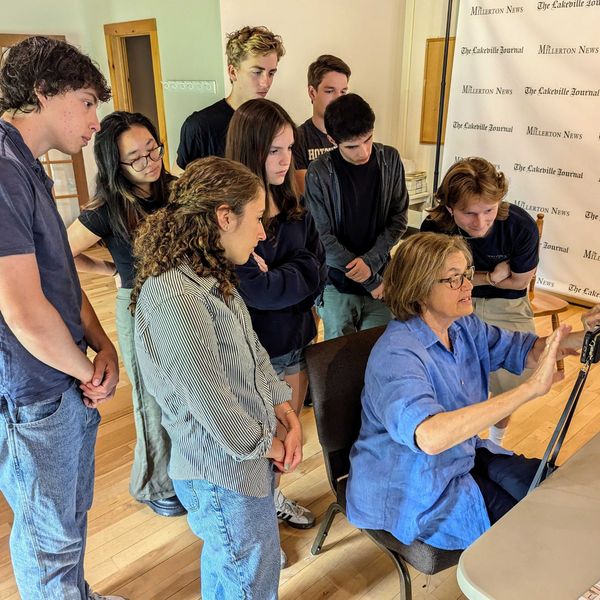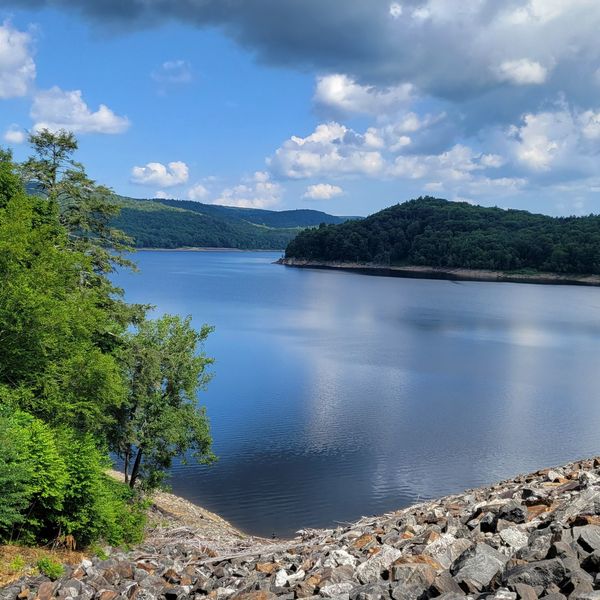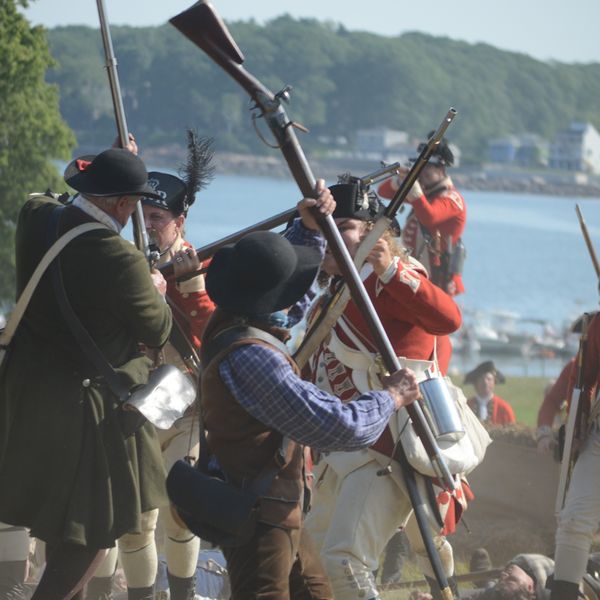Latest News
AMENIA — Dutchess County Sheriff’s Deputies broke up a political dispute between two Amenia residents at Fountain Square in downtown Amenia on Tuesday, July 15.
Kimberly Travis of Amenia was conducting her daily “No Kings” anti-Trump administration protest at Fountain Square at 1:15 p.m. when Jamie Deines, of Amenia and candidate for Town Board in the Nov. 4 election, approached her.
Travis told responding deputies on the scene and The News she felt threatened by Deines. “She was very intimidating,” Travis said. “And I have not felt fear in the whole time I’ve been doing this.”
A man who asked to be identified only by his first name, Tom, stopped by the square on his lunch break to chat with Travis just before Deines’s arrival. He said he too was alarmed by Deines’s demeanor and called 911 shortly after the interaction began.
In an effort to de-escalate, Travis said, she turned away and started walking down the sidewalk along Route 343 away from Fountain Square. Deines followed close behind, Travis said, who then called 911 too.
The Millerton News received a letter to the editor from Travis on Monday, July 28, detailing the interaction and condemning Deines for her conduct. She sat down in The News’s office in Millerton for an interview on Wednesday, July 30; just over two weeks after the interaction.
Deines paints a different picture of the interaction. “I just countered some of her arguments about Trump,” Deines said. “And she apparently didn’t like that so she called the cops.”
Deines wouldn’t go into specifics about the conversation, but she denied being threatening or physically intimidating to Travis during the interaction. Deines said during a brief interview in the Freshtown parking lot in Amenia that responding deputies told her she wasn’t doing anything wrong.
“We were standing there, talking,” Deines said. “I was just walking and saying my piece and talking to her and asking her questions, that’s all. It’s loud. Cars are going by, so it’s loud.”
Police arrived and took statements from Deines and Travis, recorded in a redacted police report obtained by the Millerton News on July 25. According to the report, deputies told both parties they had a right to be in the square and participate in peaceful protest.
Deputies left the scene and Deines left shortly after. Travis packed up her signs and left as well, as she usually does at that time in the afternoon. There were no fines, charges or other enforcement action taken as a result of the dispute.
The Millerton News obtained a police report from the Dutchess County Sheriff’s Office with redacted names. A Freedom of Information Law appeal for the unredacted report was filed with the Dutchess County Attorney on Thursday, July 31, and is still pending.
Keep ReadingShow less
Gregory Bugbee, associate scientist at the Connecticut Agricultural Experiment Station (CAES), where he heads the Office of Aquatic Invasive Species (OAIS), was a guest speaker at the Aug. 2 annual meeting of the Twin Lakes Association.
Debra A. Aleksinas
SALISBURY— A fierce and costly battle to halt the spread of hydrilla in East Twin Lake may have finally paid off.
All but three remaining small patches, one near the shoreline at O’Hara’s Landing Marina and two others in deeper water as boats exit the marina and head out, have been destroyed by this summer’s treatment with the aquatic herbicide fluridone, which began on May 20. None of the remaining plants are thriving.
“We hit 90 days in mid-August, and most of the hydrilla is dead,” reported Dominic Meringolo, an environmental engineer with SOLitude Lake Management, whose company was retained by the Twin Lakes Association (TLA) to apply the lake’s 2025 herbicide treatments.
The announcement was met with relief and applause from the approximately 100 members of the Twin Lakes Association who attended the group’s annual meeting Aug. 2 at Isola Bella.
“This is the first good news we’ve had in three years with hydrilla, but we’re far from being able to say that the coast is clear,” said TLA President Grant Bogle.
He stressed that vigilance is required and Northeast Aquatic Research (NEAR), the TLA’s limnologist, will continue to do detailed plant surveys throughout the lakes. “In East Twin, we supplement these with diver-assisted surveys in the deeper water, which are expected to take place in late August or September.”
Russ Conklin, vice president of lake management for the TLA concurred. “We are going to have to do this two, three more years, or maybe longer.”
According to TLA officials, experience from past eradication and control efforts is that this is a multi-year endeavor. Left untreated, hydrilla has returned in lakes like Coventry Lake, which took a year “off” from treatment.
“The fact is,” said Bogle, “We don’t know how long we will need to continue treating the East Bay, but by keeping it in control in this section of the lake, we are attempting to keep it from spreading further both within Twin Lakes and as boats exit Twin Lakes.”
Possibly spread by fishing boats
The battle to stop the spread of the robust Connecticut River variant of hydrilla in East Twin began in the fall of 2023, when it was discovered near the marina, and had since ventured further out into the lake.
At the time of its discovery, East Twin was the first lake in the state outside of the Connecticut River, where it had been wreaking havoc, to have identified the virulent strain in its waters.
Gregory Bugbee, associate scientist at the Connecticut Agricultural Experiment Station (CAES), where he heads the Office of Aquatic Invasive Species (OAIS), was the first environmental expert to visit East Twin after the TLA’s limnologist, George Knocklein, found the stringy, dark green plant, which looks similar to the native waterweed, elodea.
“We got out there within a week, got our boat out on the lake and sent out DNA analysis confirming the Connecticut River strain,” recalled Bugbee who, along with Meringolo, were guest speakers at the TLA meeting.
“How did it get from the river into East Twin? Fishing tournaments were in the river and some people went to O’Hara’s for a tournament here,” the CAES scientist noted.
He said the Connecticut River strain had likely been around for “many, many years” before hydrilla was detected and was thought to have been contained to the river.
“But that all changed with East Twin Lake in 2023, when George Knocklein found it floating around O’Hara’s Landing Marina,” said Bugbee.
Since then, he noted, nine additional lakes have been invaded by the rapidly growing water weed. To date, they have been met with limited success in knocking back hydrilla.
Among a few of the lakes’ attempted remedies to rid hydrilla include the introduction of sterile grass carp, hand-pulling or raking them.
“Pulling it is not effective,” said Bugbee, a certified diver, who tried the method. “We went back a month or so later and the hydrilla had all regrown.”
Another lake group sponsored a “Take a Rake to the Lake Day,” where a $500 prize was offered to the person who raked the largest haul of hydrilla out of the water.
“I said, I’ve got to see this, so I went out in my boat,” said Bugbee, who recounted with humor the vision of a woman raking hydrilla into a wagon. The winner, he recalled, removed 750 pounds of plant and muck.
While the event was unsuccessful in eradicating the invasive weed, he said it did bring the problem to the forefront of people’s attention and eventually was tackled with herbicide treatments.
The immediate impact of the herbicide on native plants is being assessed by NEAR.
“We know that outside the treatment area, the plants are doing fine,” said Bogle. “We will have more definitive information on the native, rare and invasive plants at our scientific coalition meeting in the fall.”
Meanwhile, the U.S. Army Corps of Engineers (USACE) has been working for 7 years now doing trials with herbicides, said Bugbee.
“USACE does the research then turns it over to the states. We are doing boat launch surveys on all the boat launches in the state looking for hydrilla. If we can find it by the boat ramps, we can suggest management, potentially.”
The good news is, it works
Conklin noted that other than the few surviving hydrilla, “there are no other plants that George has found in that bay” where herbicide was applied. “We were able to get there, and it only took us three years.”
Fluridone treatments were calculated based on the entire volume of the east basin of East Twin and slow-release pellets were applied to the littoral zone. The pellets release over a period of six to eight weeks, with peak release at two to three weeks after application.
Liquid fluridone was used during the first three applications to boost initial concentration, followed by slow-release pellets, according to Meringolo. The goal, he explained, was to use the herbicide at between three and five parts per billion for approximately 120 days.
Because by the 90-day mark most of the hydrilla had died, Meringolo said there are no plans to continue the last two treatments, as the slow-release pellets will remain in the water close to the 120-day target.
Conklin agreed. “Why should we be killing dead plants? Let’s see what happens this year. The good news is, it works. The bad news is, we’ve got to do it again.”
The TLA official noted that a dose of good fortune was also on the TLA’s side.
“We were fortunate that George found it over here in the bay,” where the water is relatively stagnant. If we found it out in the middle lake or third lake, we would be hard-pressed to be able to do this treatment.
Keep ReadingShow less
Lisa Mae Keller
Aug 06, 2025
LIME ROCK — Lisa Mae Keller of Lime Rock, Connecticut, passed away peacefully at her home on July 26, 2025, following a yearlong battle with cancer. Lisa remained at home between lengthy stays at Smilow Cancer Hospital – Yale New Haven. Throughout Lisa’s ordeal, the family home was a constant hub of love and support, with friends and relatives regularly dropping by. Their presence lifted Lisa’s spirits and helped her stay positive during even the toughest moments. The family remains deeply grateful to the community for their unwavering kindness and encouragement.
Born on June 2, 1958, in Bridgeport to Mae and Robert Schmidle, Lisa graduated from Newtown High School in 1976. Lisa first attended Ithica College to pursue a degree in fine arts concentrating on opera. Drawn to a more robust and challenging curriculum, Lisa transferred to Whittier College, Whittier, California earning a Bachelor of Science degree. It was in 1988 that Lisa met and married Robert (Rob) Keller in Newtown, Connecticut. Together, they embarked on a remarkable journey. The couple started small businesses, developed land in Litchfield County and welcomed in quick succession their sons Baxter and Clayton. The growing family discovered the long-abandoned historic Lime Rock Casino in 1993, while attending a race at Lime Rock Park. The couple found it difficult to commute for work while raising a family and restoring a vintage home. Lisa persuaded her husband that chimney sweeping was a noble profession, leading them to purchase the established business, Sultans of Soot Chimney Sweeps. She later leveraged her role into ownership of the largest U.S. importer of vintage Italian reproduction gun parts. Even as her entrepreneurial ventures expanded, Lisa continued managing the pick, pack, and ship operation for Kirst Konverter, though she sold the remainder of the business prior to her illness. Lisa will be remembered for her business acumen, community service, and being a trained vocalist with the Crescendo Coral Group of Lime Rock. Lisa tended the extensive gardens around the home and curated an art collection that adorns the walls within. Baking cookies was a passion. Countless cookie packages were sent world wide to each son and their military friends while deployed. It is still undetermined in the Keller house whether the Army or Marines leave less crumbs. At Christmas, the Lakeville Post Office staff would post over 80 packages of cookies to lucky recipients, while receiving a tray for their effort. Unable to bake cookies in her last year, Lisa selflessly compiled and self-published “ Pot Luck at The Casino”, a 160 page book of all of her favorite recipes, sent to everyone on her cookie list. It was a true labor of love.
A love of pearls and turquoise inspired Lisa to design and commission heirloom quality jewelry to be passed down thru the generations. Visitors were often gifted Tahitian pearl jewelry and knowledge gleaned from years of research. Travel plans for further pearl and gem study were cancelled when Lisa received her cancer diagnosis.
One of her most enduring passions—and a decades-long devotion—was embracing the role of American mother to the young German football players on scholarship at Salisbury School. Unable to return home during holidays and school breaks, the boys found a second family with the Kellers. Lisa did what any mother would do: baked endless batches of her legendary cookies, cooked countless home-made meals, and often counseled the young men through the trials and tribulations of young love. Years later, and with families of their own, they still make it a point to ‘swing by’ and visit ‘Momma Lisa’ whenever they’re back in the States.
Lisa is predeceased by her parents and is survived by husband, Rob, and two sons, Baxter (Elizabeth) and Clayton (Brette), two grandchildren, Isabel and Ezra, two brothers Robert, Jr. (Pam) Schmidle, Paul (Wendy) Schmidle, and multiple nieces and nephews. Grandson Ezra was born and met Mama Lisa just days before she passed.
A graveside ceremony will be held on Aug. 9 at 11 a.m. at the Lime Rock cemetery, with a reception at the Lime Rock Episcopal Church. A celebration of life will be held at the family home, The Historic Lime Rock Casino, on Oct.11, 2025 at 4 p.m.
All are welcome to both events. In lieu of flowers, donations can be made to SalvageUSA.org, a nonprofit organization dedicated to serving the special operations active duty and veterans community.
Keep ReadingShow less
John Richard Krupinski
Aug 06, 2025
LITCHFIELD — John Richard (Jr.) Krupinski, of Winsted, Connecticut passed away on Sunday, July 27, 2025, at Hartford Hospital.
Born on Jan. 13, 1948, in Torrington, Connecticut he was the son of John Joseph Krupinski and Eleanor (Kavesky) Krupinski. John grew up in Litchfield, Connecticut and graduated from Litchfield High School in 1967. While still in high school, John was a member of the Litchfield Volunteer Fire Department.
John joined the Air Force in 1968 and was honorably discharged in 1972 as a Sargent. John went on to work for the State of Alaska with the Department of Fish and Game as well as being an Alaska State Trooper. Upon returning to Connecticut John worked for the State of Connecticut as a Deputy Warden for the Forestry Department.
John loved the outdoors, was an avid fly fisherman and from a young age enjoyed tying his own flies. John was known as the best fly tier in Northwest Connecticut. John also competed in Archery, receiving numerous trophies.
John is survived by his daughter, Cheryl L. Bentley, sister, Karen J. Krupinski, and brother, Thomas J. Krupinski. John was preceded in death by his parents, John and Eleanor Krupinski, his wife, Margery Hull Krupinski, and their beloved pets.
Calling hours will be held at Thurston Rowe Funeral Home, 283 Torrington Road, in Litchfield, on Sunday, Aug. 10, 2025 from 3 p.m. to 5 p.m. A funeral service with Military Honors will be held at Hillside Cemetery, 76 Walnut Street, in Torrington, on Thursday, Aug. 21, 2025 at 12:30 p.m.
In lieu of flowers, donations can be made to Farmington River Anglers Association, Housatonic Fly Fisherman’s Association or Trout Unlimited, Northwest Connecticut Chapter.
To send the family online condolences kindly visit www.thurstonrowefuneralhome.com
Keep ReadingShow less
loading








